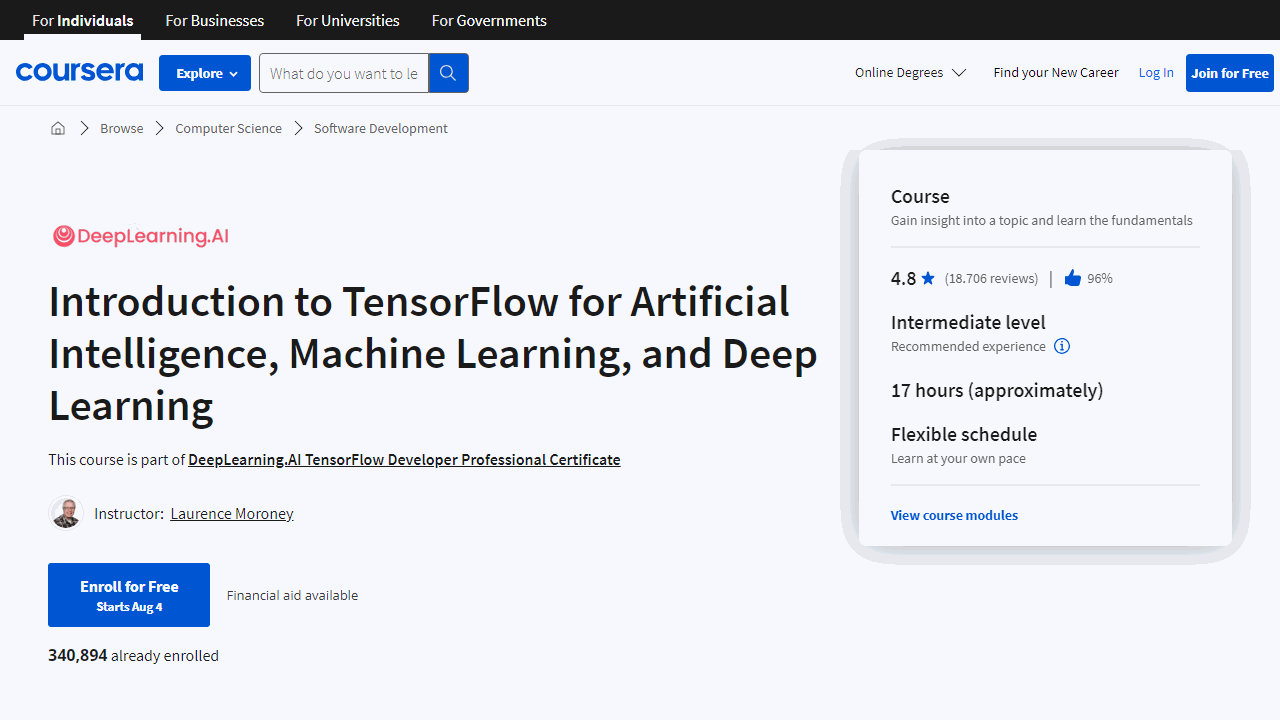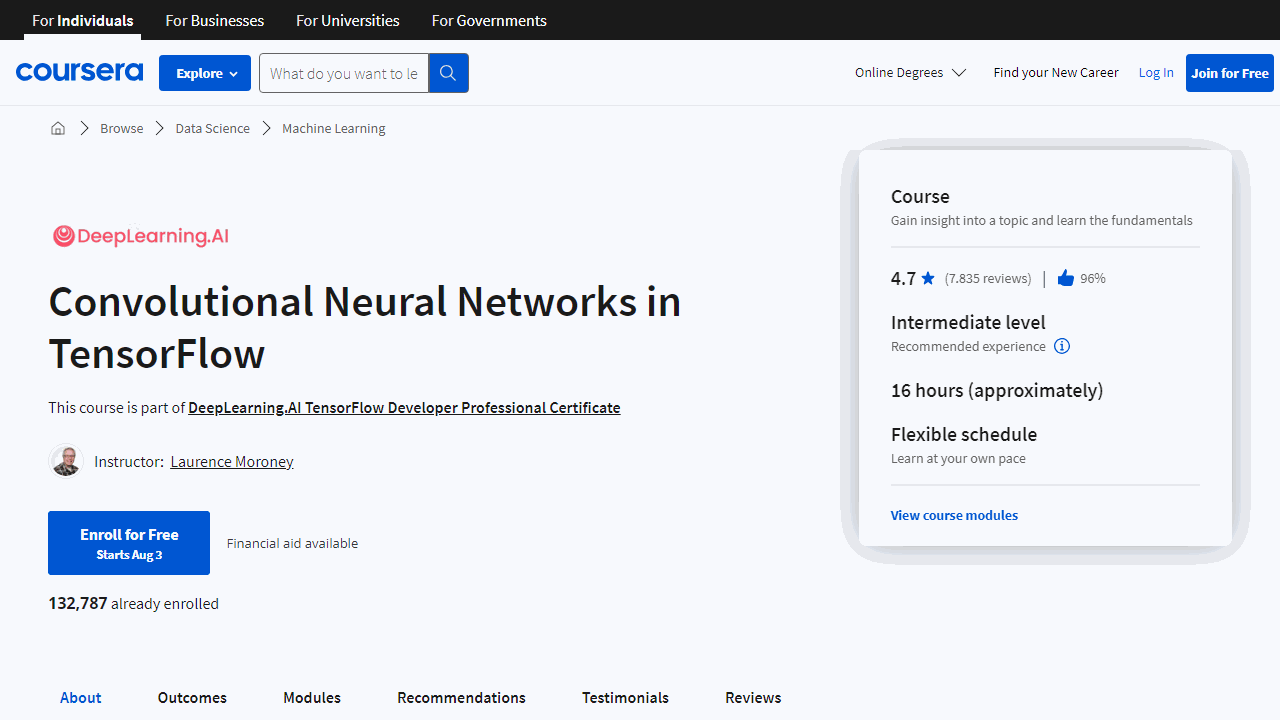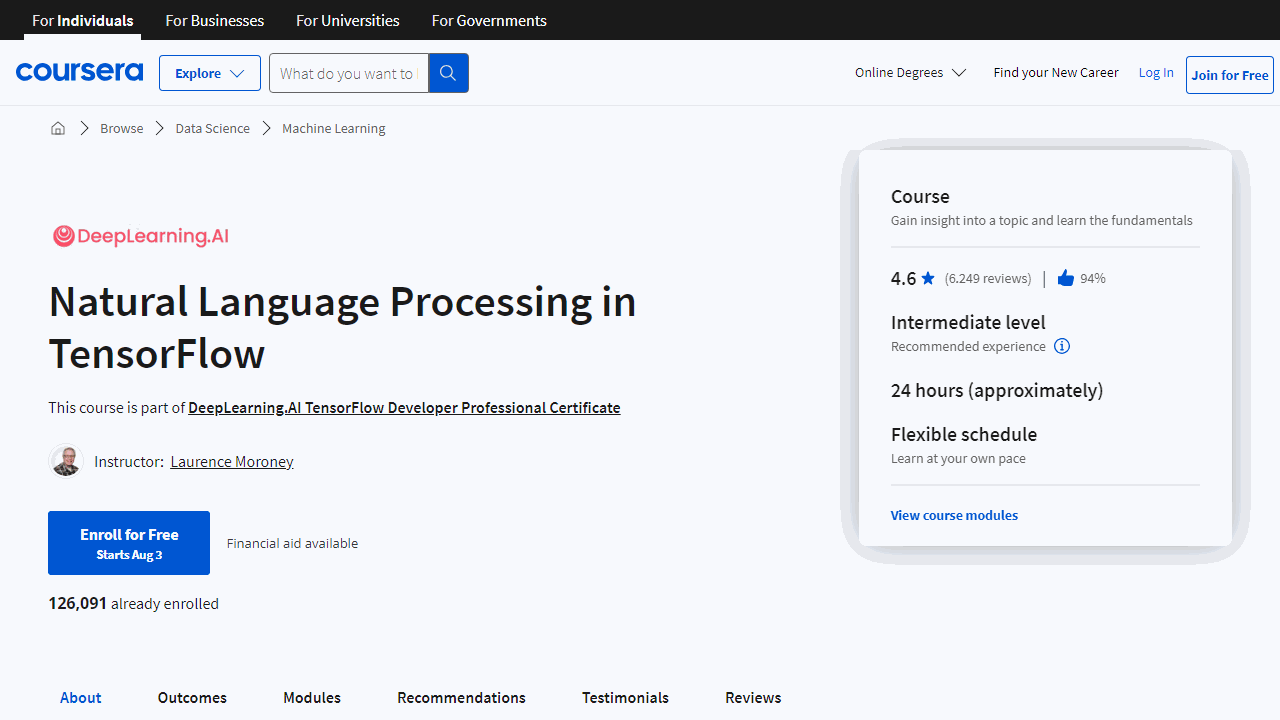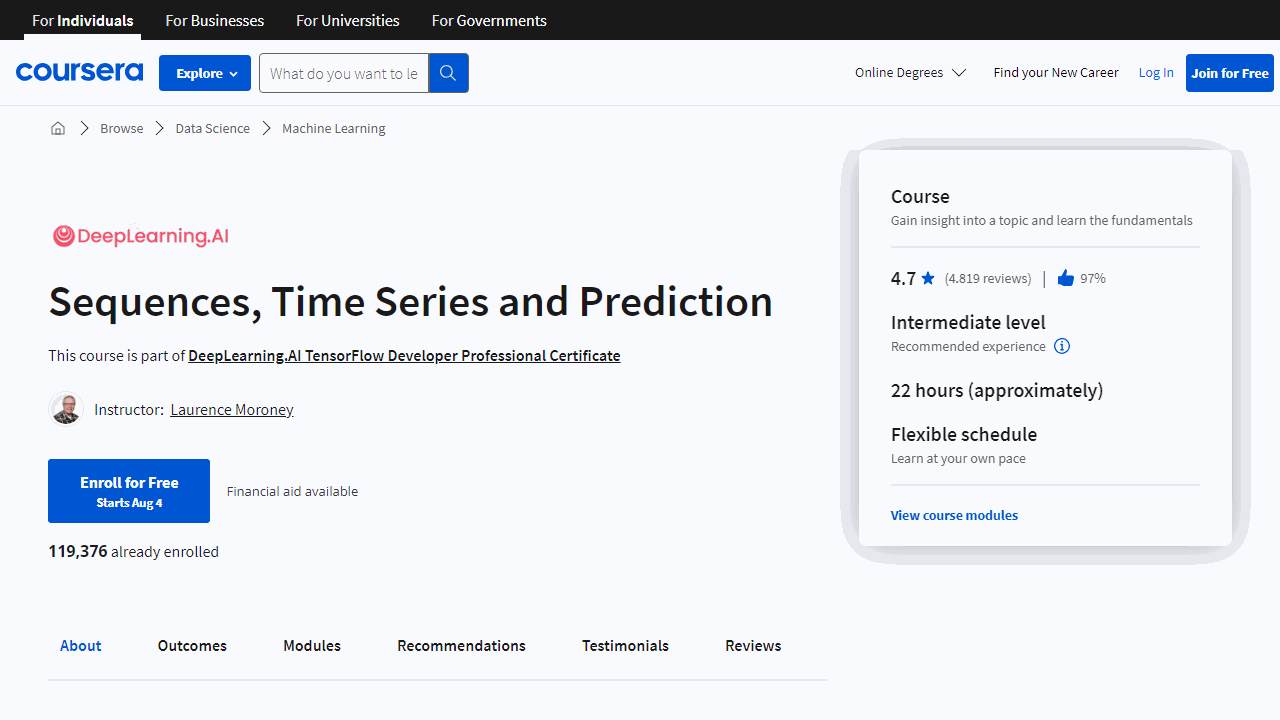- Rating: 4.7/5 with 20.466 ratings
- Provider: DeepLearning.AI
- Teacher: Laurence Moroney
- Price: $49/month
- Duration: Approx. 2 months if you study 10 hours per week (80 hours total)
- Pre-requisites: intermediate Python skills, basic Linear Algebra and machine learning knowledge
- Level: Intermediate
- Certificate: Yes
- Coursera Plus: No
Are you worried about how to prepare effectively for the TensorFlow Developer Certification exam?
You’re not alone.
Many aspiring TensorFlow developers are in the same boat, grappling with the challenge of finding comprehensive, reliable study materials to help them confidently take the exam.
This article is here to address your concerns.
We’ll delve into the TensorFlow Developer Professional Certificate on Coursera, a program designed by DeepLearning.AI.
This certification is definitely worth it if you are looking to learn all the necessary knowledge and skills to pass the certificate exam with confidence.
The program consists of four main courses that cover a wide range of topics - from the nuts and bolts of TensorFlow to more intricate areas like Convolutional Neural Networks, Natural Language Processing, and Sequences and Time Series.
By following along with the insights shared in this article, you’ll be able to plan your study effectively and step into the exam with confidence.
Introduction to TensorFlow for Artificial Intelligence, Machine Learning, and Deep Learning
- Rating: 4.8/5 with 18.709 ratings
- Duration: Approx. 17 hours
This course is designed to introduce you to the basics of TensorFlow and Keras, two essential tools in the field of machine learning and deep learning.
The course content is well-structured, starting with a primer in machine learning and gradually moving to more complex topics like convolutions, pooling, and using ImageDataGenerator.
The course is praised for its practical approach, as it allows you to start creating your first neural networks using Keras.
It starts with a simple “Hello World” model and builds up to a more complex Convolutional Neural Network (CNN), explaining new methods as they are introduced.
This makes the course exciting and engaging, and you can expect to gain a good grasp of TensorFlow and Keras by the end of it.
On the positive side, many students found the course a great starting point for beginners in TensorFlow.
It is also seen as a good follow-up to Andrew Ng’s Stanford Machine Learning specialization.
Some students felt the course was too basic and didn’t go into enough depth about TensorFlow.
They wanted more in-depth treatment of the material, covering more ground or going into more depth on the machine learning theory.
There were also concerns about the course being too fast for someone who hasn’t taken any deep learning courses before.
The course also received criticism for focusing too much on Keras API and not enough on TensorFlow itself.
Some students felt that the course was more of a basic introduction to Keras rather than TensorFlow.
In conclusion, while the “Introduction to TensorFlow” course has its flaws, it is still a good starting point for beginners.
The course provides a solid foundation in these tools, which are essential for anyone interested in machine learning and deep learning.
What You Will Learn
- Understand the basics of machine learning and its applications
- Learn how to code a neural network in TensorFlow and Python
- Gain knowledge about computer vision and its importance in machine learning
- Learn how to load training data for machine learning models
- Understand the concept of Callbacks and how to use them in controlling training
- Learn about convolutions and pooling in the context of image processing
- Improve image classifiers using convolutions
- Understand the use of ImageDataGenerator in TensorFlow
- Learn how to define and train a Convolutional Neural Network (ConvNet) for complex images
- Explore the impact of image compression on the performance of machine learning models.
Convolutional Neural Networks in TensorFlow
- Rating: 4.7/5 with 7.835 ratings
- Duration: Approx. 16 hours
If you’re looking for a practical introduction to Convolutional Neural Networks (CNNs), this course may be just what you need.
It’s a compact, well-structured course that provides a clear pathway to understanding and implementing CNNs using TensorFlow.
The course starts off by revisiting basic concepts of convolutions, model compilation, and building.
It then expands on these concepts by introducing image augmentation, transfer learning with Inception, and multi-class classification.
You’ll learn how to implement these techniques in TensorFlow, giving you a solid foundation in both the theory and practice of CNNs.
One of the unique aspects of this course is its focus on practical exercises.
Although some students found the exercises simplistic, many others appreciated the hands-on experience they provide.
The exercises are designed to help you understand how to structure your code and work with Jupyter notebooks.
They also offer a chance to experiment with machine learning and deep learning in a controlled environment.
The course’s instructor, Laurence Moroney, is praised for his ability to explain complex concepts with ease.
Students found his lectures clear and informative.
Additionally, the course features conversations with Andrew Ng, a renowned expert in the field of AI and deep learning, which students found incredibly valuable.
Transfer learning, a technique that allows you to leverage previously trained models on larger datasets, is a highlight of the course for many students.
This technique can lead to more accurate predictions and better results, making it a valuable tool in your machine learning toolkit.
Despite some criticisms regarding the depth of the content, the course is generally well-received.
It’s an excellent choice if you’re looking for a practical, hands-on introduction to Convolutional Neural Networks with TensorFlow.
It’s not an in-depth exploration of the subject, but it provides a solid foundation that you can build upon.
Although this course is focused on Computer Vision applications, it doesn’t cover image generation techniques, but there is a dedicated GANs specialization for those interested.
What You Will Learn
- Understand the basics of Convolutional Neural Networks (CNNs) and their applications in image recognition tasks.
- Learn how to train a CNN using the cats vs. dogs dataset, gaining practical experience in handling real-world data.
- Explore the concept of image cropping and its impact on the performance of a CNN.
- Visualize the effect of convolutions on image data, enhancing your understanding of how CNNs process images.
- Analyze the accuracy and loss metrics of a CNN, developing skills in model evaluation and performance tuning.
- Discover the technique of data augmentation and its role in preventing overfitting in CNNs.
- Implement data augmentation using the ImageDataGenerator in TensorFlow, gaining hands-on experience with this powerful tool.
- Understand the concept of transfer learning and its benefits in training deep learning models.
- Apply transfer learning from the Inception model, learning how to leverage pre-trained models for your own tasks.
- Transition from binary to multi-class classification, expanding your skills to handle more complex classification problems.
Natural Language Processing in TensorFlow
- Rating: 4.6/5 with 6.251 ratings
- Duration: Approx. 24 hours
Student’s experiences with this course are a mixed bag.
While some found it too basic and lightweight, others praised it for its practical approach and easy-to-grasp content.
To start with, the course is designed to introduce you to the world of Natural Language Processing (NLP).
It covers essential topics such as word-based encodings, text to sequence, padding, and sarcasm detection.
It also delves into more complex topics such as using vectors, building classifiers, working with pre-tokenized datasets, and implementing LSTMs (Long Short-Term Memory) in code.
This variety of topics ensures a comprehensive understanding of NLP.
You get to work on interesting short projects and exercises that help you apply what you’ve learned.
This hands-on experience can be invaluable, especially if you’re planning to implement NLP in your future projects.
However, some students felt that the course could have delved deeper into certain topics.
Some also mentioned that the quizzes were not challenging enough and did not test relevant information.
Despite these criticisms, many students found the course beneficial.
They appreciated the instructor, Laurence Moroney, for his easy learning style and deep knowledge.
Some even mentioned that this course was the best in the Tensorflow series.
This course could be a good fit for you if you’re a beginner in the field of NLP or if you prefer a practical, hands-on approach to learning.
If you’re already familiar with the basics of NLP and are looking for a more in-depth course, you might want to explore other options.
What You Will Learn
- Understand the basics of Natural Language Processing (NLP) and its applications in TensorFlow.
- Learn how to use word-based encodings to convert text into a format that a machine learning algorithm can understand.
- Gain proficiency in using APIs to access and manipulate data for NLP tasks.
- Master the use of the Tokenizer in TensorFlow to convert text into sequences of numbers.
- Learn how to handle varying sequence lengths by applying padding techniques.
- Understand the concept of sarcasm in text and how to build a classifier to detect it.
- Dive deep into the IMDB dataset and learn how to use vectors for text classification.
- Explore the use of Long Short-Term Memory (LSTM) networks in NLP and how to implement them in TensorFlow.
- Learn how to use a Convolutional Neural Network (CNN) for text classification tasks.
- Understand how to prepare training data for NLP tasks and predict the next word in a sequence using TensorFlow.
Sequences, Time Series and Prediction
- Rating: 4.7/5 with 4.819 ratings
- Duration: Approx. 22 hours
This course’s focus is on time series data and machine learning methods for forecasting.
This is one of the most used applications of machine learning in industry.
Everywhere you go, you’ll find companies using machine learning to predict time series data, from inventory levels to weather forecasts.
It covers a wide range of topics, from the basics of time series to more advanced topics like LSTM, Convolutional Neural Networks, and Bi-directional LSTMs.
The course is also practical and hands-on, with screencasts and examples of how to feed windowed datasets into a neural network, code LSTMs, and train and tune models.
Some students thought that the course could delve deeper into certain topics and provide a more rigorous understanding of the underlying principles.
Additionally, some found the quizzes to be too easy and not reflective of the course content.
Despite these criticisms, many students found the course helpful and appreciated its focus on practical application.
While this course might not offer the depth and rigor that some students are looking for, it can provide a practical introduction to handling time series data with Tensorflow.
It’s a good starting point for those new to the field or those looking to apply these concepts in a practical setting.
However, it might not be the best fit for those looking for a more theoretical and in-depth exploration of these topics.
A great suggestion as a next step, after finishing this series of courses, is to take a look at the Tensorflow: Data and Deployment Specialization, which covers more advanced topics like data pipelines, distributed training, and model deployment.
What You Will Learn
- Understand the basics of time series and its common patterns
- Learn how to apply machine learning to time series data
- Gain knowledge on how to prepare features and labels for time series prediction
- Master the use of single layer and deep neural networks for time series prediction
- Get a conceptual overview of Recurrent Neural Networks (RNNs) and their application in time series prediction
- Learn how to adjust the learning rate dynamically for better model performance
- Understand the use of Long Short-Term Memory (LSTM) networks in time series prediction
- Learn about the application of convolutions and bi-directional LSTMs in time series prediction
- Gain practical experience by working on real data, such as sunspots
- Learn how to combine different tools for time series analysis and prediction.
Frequently Asked Questions
How Long Does It Take To Complete The TensorFlow Developer Professional Certificate?
It’s estimated to take approximately 2 months to complete if you study around 10 hours per week.
This means the total duration of the series of courses is roughly 80 hours.
However, the actual time it takes can vary depending on your prior knowledge, learning pace, and the amount of time you can dedicate to the courses each week.
How Much Does The TensorFlow Developer Professional Certificate Cost?
The TensorFlow Developer Professional Certificate on Coursera costs $49 per month.
This fee gives you access to all the course materials, graded assignments, and a certificate upon completion.
Please note that prices may vary depending on your location and any promotions Coursera may be running at the time.
Is The TensorFlow Developer Professional Certificate Part Of Coursera Plus?
No. Coursera Plus subscribers do not have access to the TensorFlow Developer Professional Certificate.
What Is The Difference Between A Coursera Course And A Professional Certificate?
A Coursera Course is a single class that explores a specific topic in-depth.
It is typically part of a broader learning path or specialization, but it can also be taken individually for learners interested in a single subject.
A course can range from a few days to several weeks, depending on the complexity of the topic.
On the other hand, a Professional Certificate is typically larger in scope and requires a longer commitment than a single course, as it goes in-depth into a specific professional field.
Unlike individual courses, this program also has a focused goal of preparing learners for a certification exam in the respective area of study.
How To Get The TensorFlow Developer Professional Certificate For Free?
Coursera offers financial aid for students who cannot afford the fee.
You can apply for financial aid by clicking on the “Financial aid available” link next to the “Enroll” button on the course page.
You’ll need to fill out an application and wait for approval, which can take up to 15 days.
Also, Coursera occasionally offers promotions or discounts, so it’s worth checking their website regularly.
Please note that while you may be able to access some course materials for free during a trial period, you typically need to pay for the course to receive a certificate.




